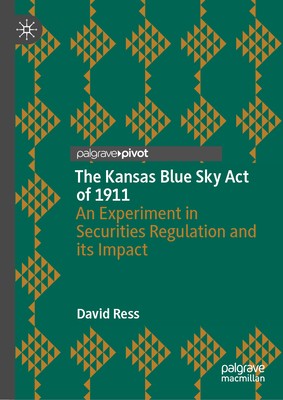
- We will send in 10–14 business days.
- Author: David Ress
- Publisher: Palgrave Macmillan
- ISBN-10: 3031438302
- ISBN-13: 9783031438301
- Format: 14.8 x 21 x 1.1 cm, kieti viršeliai
- Language: English
- SAVE -10% with code: EXTRA
Reviews
Description
This Palgrave Pivot presents the first in-depth study of the pioneering Kansas Blue Sky Act of 1911, the first effort in American financial history to regulate the sale of securities in the US. Though offering a balanced examination of critiques of the legislation as a barrier to individual liberty, interstate commerce, and economic growth, the author challenges the prevailing view of the Kansas Act as a complete anomaly, instead exploring sensitively what 'blue sky laws' can tell us about small-town market values during the nineteenth-century.
Drawing on contemporary accounts of rural commerce and popular stereotypes about rural society, the author takes a cultural-historical approach to the politics of regulation and government intervention in the economy. Situating the Blue Sky Act in the broader context of Progressive Era reforms, the author demonstrates how distinctive patterns of commerce and finance in the self-contained, miniature economies of mid-continental rural communities were often at odds with the "caveat emptor" (buyer beware) standard of American law and commerce in larger markets. Instead the author explores how paternalistic assumptions about individual investment decisions led to the creation of the Act, yet how it was doomed to failure in the context of emerging national stock markets, changing attitudes that regarded stock primarily as a vehicle for trade and the market boom of the 1920s. The book also explores how the initial acceptance of the Kansas model in other states and its later rejection provides a lens through which to examine the fluidity of notions of individual liberty during this period of fast economic and social change. This book will be of interest to researchers working in American financial history, as well as legal history and securities law.
EXTRA 10 % discount with code: EXTRA
The promotion ends in 23d.15:36:18
The discount code is valid when purchasing from 10 €. Discounts do not stack.
- Author: David Ress
- Publisher: Palgrave Macmillan
- ISBN-10: 3031438302
- ISBN-13: 9783031438301
- Format: 14.8 x 21 x 1.1 cm, kieti viršeliai
- Language: English English
This Palgrave Pivot presents the first in-depth study of the pioneering Kansas Blue Sky Act of 1911, the first effort in American financial history to regulate the sale of securities in the US. Though offering a balanced examination of critiques of the legislation as a barrier to individual liberty, interstate commerce, and economic growth, the author challenges the prevailing view of the Kansas Act as a complete anomaly, instead exploring sensitively what 'blue sky laws' can tell us about small-town market values during the nineteenth-century.
Drawing on contemporary accounts of rural commerce and popular stereotypes about rural society, the author takes a cultural-historical approach to the politics of regulation and government intervention in the economy. Situating the Blue Sky Act in the broader context of Progressive Era reforms, the author demonstrates how distinctive patterns of commerce and finance in the self-contained, miniature economies of mid-continental rural communities were often at odds with the "caveat emptor" (buyer beware) standard of American law and commerce in larger markets. Instead the author explores how paternalistic assumptions about individual investment decisions led to the creation of the Act, yet how it was doomed to failure in the context of emerging national stock markets, changing attitudes that regarded stock primarily as a vehicle for trade and the market boom of the 1920s. The book also explores how the initial acceptance of the Kansas model in other states and its later rejection provides a lens through which to examine the fluidity of notions of individual liberty during this period of fast economic and social change. This book will be of interest to researchers working in American financial history, as well as legal history and securities law.


Reviews